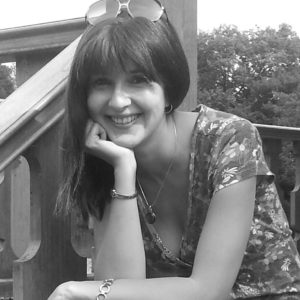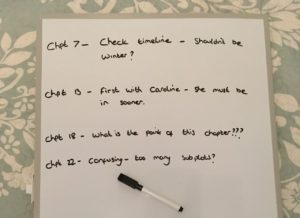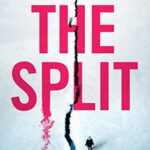I’m pleased to be able to welcome crime writer, Louise Jensen back to the blog to talk about her revision process.
 Louise is a USA Today Bestselling Author, and lives in Northamptonshire with her husband, children, madcap spaniel and a rather naughty cat.
Louise is a USA Today Bestselling Author, and lives in Northamptonshire with her husband, children, madcap spaniel and a rather naughty cat.
Louise’s first two novels, The Sister and the Gift, were both No.1 Bestsellers, and have been sold for translation to thirteen countries. The Sister was nominated for The Goodreads Awards Debut of 2016. Louise is currently writing her third psychological thriller.
Louise loves to hear from readers and writers and can be found at www.louisejensen.co.uk, where she regularly blogs flash fiction.
You can find Louise’s First Draft process, Here.
Your first draft has been completed, what state is it generally in?
Oh it’s rough. Very rough!
What is the first thing do before you start to revise?
I send the manuscript to my kindle and read it as a reader, assessing the weak points. I’ve a white board I’ll perhaps scribble observations on as I go but I try not to break the flow by making too many notes during the first read through.
How do you assess the damage that needs working on?
As I read I notice if there’s enough of a hook. Enough twists and turns. Am I engrossed? If I’m bored reading it, readers will be too.
Do you allow anyone to read that very first draft before revisions or can you assess it objectively yourself?
The first draft is always purely for me.
What do you initially focus on, when approaching the completed first draft of the manuscript?
Getting the story to flow and be credible and consistent is the first thing I’m looking for. Character development and those little details that bring a scene to life come much, much later.
Do you have any rituals, writing or real-world, when revising a manuscript?
As a relatively new writer I’m still finding my feet with what works and what doesn’t but the final stage for me is always reading my manuscript aloud.
 In what format do you revise, paper or computer?
In what format do you revise, paper or computer?
Once I’ve done the initial read on my kindle I tackle any obvious structural issues and then I print out and work through the manuscript making notes on the pages.
How messy is the revision process – can you go in and repair areas or does the whole manuscript get decimated?
It’s carnage! With both The Sister and The Gift I lost around 50,000 words as neither story was working for me.
Is revision an overhaul of the story or is it minor editing?
I don’t plan and although I think of plot ideas as I write I can’t tell if they are going to work until I have actually written them and I read them back so there is much overhauling. Hats off to all the writers who only ever write 3 drafts. I’m always into double figures.
What’s the biggest change you’ve made to a story during this process?
I’d wanted to write The Sister in present tense but I’d been advised by other writers not to do this as both readers and agents wouldn’t like it. Reading through the completed manuscript I realized it wasn’t the story I wanted it to be as it didn’t feel immediate enough and I decided to change all the present day chapters to present tense. Being a new writer I had no idea of the enormity of the task. My husband said in the morning ‘don’t forget we’re going out to lunch today,’ and I said ‘I’m just changing the tense first.’ Two weeks later I was still restructuring sentences, getting it to flow as though I’d originally written it in present tense.
When first drafting, many writers keep track of progress by counting words in a day. How do you make sure you’re progressing as you’re revising?
I haven’t found a way to track progress but I don’t feel a need to. I work on the manuscript every day and chip away at it bit by bit. Some ‘quick’ changes take days and some structural edits you thing will be enormous can be completed really quickly. I find I can focus for much longer periods of time editing than I can writing a first draft.
Do you prefer to write the first draft or do you prefer the revision process?
With The Sister it was definitely the first draft. That excitement of finally writing a book. The not knowing where it will go. Now I have to say the revision process. By then you know your characters really well and shaping the story to suit them is the fun bit.
What do you drink while you’re working?
While I’m working water, green tea or coffee. A white wine at the end of the day.
How long does this process take and what shape is the book now in?
The Sister took ages – at one time I had 27 versions on my PC. The Gift took around 6 months. With book 3 I have a deadline and the pressure is on to halve that time. Wish me luck!
Thanks for showing us the inner workings!
You can find Louise on her Website | Amazon.com | Amazon.co.uk
The Gift
 The perfect daughter. The perfect girlfriend. The perfect murder?
The perfect daughter. The perfect girlfriend. The perfect murder?
Jenna is given another shot at life when she receives a donor heart from a girl called Callie.Eternally grateful to Callie and her family, Jenna gets closer to them, but she soon discovers that Callie’s perfect family is hiding some very dark secrets …
Callie’s parents are grieving, yet Jenna knows they’re only telling her half the story. Where is Callie’s sister Sophie? She’s been ‘abroad’ since her sister’s death but something about her absence doesn’t add up. And when Jenna meets Callie’s boyfriend Nathan, she makes a shocking discovery.
Jenna knows that Callie didn’t die in an accident. But how did she die? Jenna is determined to discover the truth but it could cost her everything; her loved ones, her sanity, even her life.



Great article, Rebecca.
Thanks for reading Ian.
That’s a lot of words cut. That would be two-thirds of one of my books.
It was a scary amount and I wasn’t sure if I could replace them but I’m so pleased I did it.
I’m really enjoying this feature! And I like the idea of reading the book on another device, as a reader. That gives a really useful perspective. Thanks, both.
Thanks Margot. I find it too easy to start fiddling with it if I read on a PC.
Great interview overall and many interesting issues raised, but my favourite part has got to be: ‘My husband said in the morning ‘don’t forget we’re going out to lunch today,’ and I said ‘I’m just changing the tense first.’ Two weeks later I was still restructuring sentences…’
Oh the naivety of writing my very first book! How I miss those days!
Lol @ changing tense before lunch! I’ve done the same thing previous, and it really does take a full sentence-structure obliteration to get it right. I mostly write in present – I hope I don’t put too many people off.
The Gift sounds really interesting, Louise 🙂
Thanks Annalisa. I’m writing again in present, it’s what I like to read too.